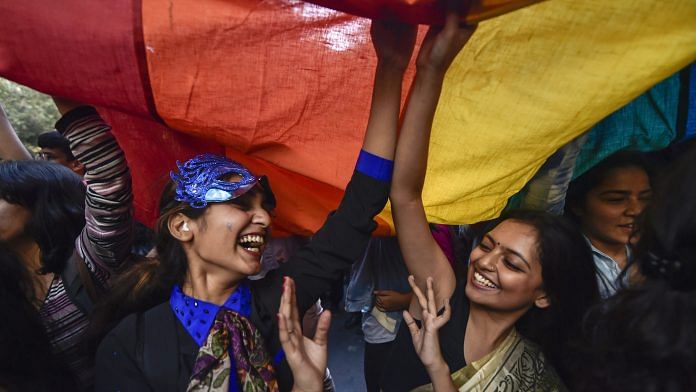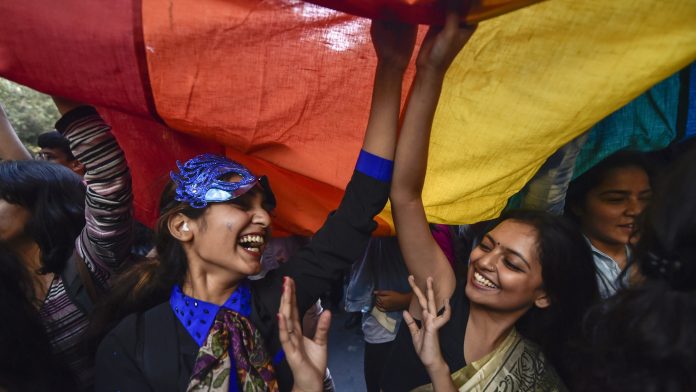
Text Size:
Ask Indians what matters most to them and they are likely to say, my family. But in an India that places the family at the centre of the universe, it’s strange that not all Indians get to have one.
How many queer parents have you come across at adoption centres, parent-teacher meetings or even eating ice cream with their children at the mall? The fight that started with de-criminalising Section 377 must not end there – it is a battle half won. And what began as revocation of a ban must now expand to a full realisation of civil rights. Otherwise, the slide is always a looming danger.
The LGBTQ+ community still doesn’t have the right to marry in India, and parenthood is out of the question for most. And do you even need to marry to be a parent?
Who is family?
An advertising professional, author and entrepreneur, Raga Olga D’Silva is the mother of 23-year-old twins. Born in Mumbai and currently based in London, D’Silva raised her son and daughter with her partner, Nicola Fenton. D’Silva and Fenton have been in a same-gender relationship for over 13 years now. For the children, D’Silva says, it has been like a lottery win – they are loved by three parents, two mothers and a father.
But things were not easy for the family when they came to India. Nicola was not recognised as a legal parent of the kids. D’Silva elaborated, “It was challenging when we went for school admissions, we could only have Nicola on the form as a ‘friend’ or ‘emergency contact’. The same was true for health-related decisions regarding the children. She couldn’t legally make decisions on their behalf. She was never accepted as a parent.”
In a country where rights for single parents and live-in couples with children is still an arduous battle, the discrimination against LGBTQ+ parents is not even part of public conversations. The right to parenthood for people of the LGBTQ+ community is not recognised or accommodated by law or even society. Although the Supreme Court has in past judgments interpreted the scope of Article 21 of the Constitution – the right to life and personal liberty – to include the right to motherhood and right to reproductive autonomy, this does not seem to apply equally to same-sex couples, transgender individuals and the LGBTQ+ community more generally. In fact, Article 16 of the United Nations’ Universal Declaration of Human Rights states that “men and women of full age… have the right to marry and to found a family.” The phrasing in this 72-year-old document is exclusionary; but even in the India of 2021, the right to begin a family is only available to heterosexual cisgender men and women.
Also read: ‘This is for every citizen’s right’ — HC seeks Centre, Delhi govt stand on same-sex marriages
Rule of law
There’s not much anyone can do when it comes to parenting if even the legal roads are closed for you.
Most laws and rights that fall in the domain of family law in India, including those related to adoption, surrogacy, succession, guardianship and so on, are in some way or the other tied to marriage. And since the LGBTQ+ community has been excluded, so far, from the right to marriage, access to all these other laws is curtailed too.
Anand Grover, senior lawyer and well-known HIV and LGBTQ+ rights activist, explained, “Since they [members of the LGBTQ+ community] cannot get married, they are forced to find all sorts of other ways like adopting in one partner’s name instead of together, for example. And then there are also a lot of people who do not want to get married at all. Why should they have to? The option of pacts or recognised agreements should be explored too.” In New Zealand, where D’Silva and her family also spent many years, civil unions and de facto relationships between two people are recognised by law. These are formalised relationships that couples choose to enter into; they are then entitled to almost all the same rights that married couples have.
According to India’s Adoption Regulations, 2017, as published on the official website for the Central Adoption Resource Authority (CARA), couples who have been married for at least two years, as well as single women, can adopt a child of any gender while a single man is eligible only to adopt a male child. There is no mention of couples in live-in relationships, same-sex couples and transgender individuals, almost as if they do not exist.
The CARA helpline says “there is no such provision” for same-sex couples to adopt. When I asked about transgender individuals, I received the same answer, “There is no provision for them to adopt. If you want to know more about this, you can write us an email. You will receive a response within four working days.” I never received a response.
It is not only the government authorities that stand in the way of adoptions by people of the LGBTQ+ community. In 2015, when Maneka Gandhi, who was the Union minister for women and child development, relaxed the adoption rules to allow single men and women to adopt, some non-governmental organisations (NGOs) that serve as adoption agencies did not approve of the decision. The Missionaries of Charity, for example, temporarily stopped adoption operations at some of their homes as it “hurt their conscience”. That a single parent who adopts may “turn out to be gay or lesbian” was one of their many concerns.
Sunil Arora, executive director of adoption agency Bal Asha Trust, says: “Currently, there is nothing in the law that explicitly stops or supports adoption by LGBTQ+ people so we need more clarity on that. Our organisation’s criteria is very simple – are you emotionally, physically and mentally prepared to adopt? That’s it.”
According to the Pew Research Centre, as of October 2019, about 30 countries of the world had passed laws allowing same-sex marriages. Most of these are in Europe, North America and South America, and only one — Taiwan — is in Asia. As for same-sex adoption, it is so far legal in around 40 countries.
Also read: ‘Marriage will protect our rights, affirm commitment’ — why same-sex couple moved Delhi HC
Surrogacy and in-vitro also a no
In the United States, surveys have shown that almost 70 per cent of same-sex parents are raising their biological children while about 20 per cent have adopted children. The biological routes that are open for LGBTQ+ couples to have children generally come under the broad category of assisted reproductive technologies. This includes surrogacy and in-vitro fertilisation (IVF) among others. In India, availing these services is complicated for the LGBTQ+ community and it’s likely to get even tougher.
The intensely debated Surrogacy (Regulation) Bill was approved by the Union Cabinet in February 2020, but is yet to be passed as an Act. According to this Bill, commercial surrogacy is completely banned, and altruistic surrogacy is allowed only for Indian married couples, Indian origin married couples and Indian single women who are widowed or divorcees. This completely excludes live-in couples, most single parents and the LGBTQ+ community.
In 2016, then minister for external affairs Sushma Swaraj had said surrogacy was not an option for gay couples because it “doesn’t go with our ethos”.
The Assisted Reproductive Technology (Regulation) Bill, 2020, which was referred to a standing committee in October last year, seeks to regulate assisted reproductive technology (ART) services in India. This includes, but is not limited to, gamete donation and IVF. Like the Surrogacy Bill, this Bill too lays down who can and cannot avail of ART services. While heterosexual married couples and single women can access the same, those in live-in and homosexual relationships as well as transgender and intersex individuals are again stripped of their reproductive autonomy.
Delhi IVF Centre, which calls itself the oldest and leading fertility clinic in India, has a whole page on its official website dedicated to “same-sex parenting”, even though the ART bill is clearly not on-board with it.
Dr Manan Gupta from the centre told me, “Currently it is legal for LGBTQ+ couples and individuals to approach our centre. Earlier, when surrogacy was legal for international patients, a lot of LGBTQ+ couples from other countries used to come to us. Now there are none. We do not have any Indian LGBTQ+ couples as of now, probably because here people are not as open. It’s uncommon for them to come forward to have a child.”
Also read: Grindr, PlanetRomeo, Gayglers — corporate queerness reached India. But many still in closet
Then there are the whispers
Even if laws were passed on parenthood and marriage for the LGBTQ+ community, will society accept? Section 377 has been decriminalised, but the stigma and the roving eyes still follow. In most Indian families, being anything other than cisgender and heteronormative is taboo.
“The prospect of moving back to India does not excite me,” D’Silva told me. “Who wants to go through all that drama and nonsense, you know? I’d rather be in a country where I’m free to be who I am.”
When D’Silva and Fenton lived in India with their children about ten years ago, they had to hide their relationship status from society and pretend to be sisters-in-law or business partners instead. “My mother told us not to tell anyone or there would be scandal in the family. We had to disguise our relationship due to the fear of rebuke from the community. If the law begins to recognise queer partnerships and parenthood, society’s acceptance will slowly follow,” she said.
Zorian Cross, an actor-director in Delhi who identifies as gay, believes that the media and entertainment industry can play a significant role in raising awareness and normalising the concept of queer parenthood, as it has been done through popular television shows like Modern Family in the United States. “If it can be showcased in a way that reaches the masses and not only shows queer families as normal but also as beautiful, that will go a long way in changing people’s mindsets,” he elaborated.
But until real change materialises, 23-year-old student and model Alexander Balakrishnan from the LGBTQ+ community expressed that most queer people have no choice but to forget about ever having children. “When I was asked if I know any queer couple with a child, I couldn’t think of anyone. And that’s so sad and telling of how few get to become parents. Something as natural as starting a family becomes revolutionary for queer people and we are made to feel like we should be grateful for this right,” he shared.
Also read: Acceptance of LGBTQ people has risen worldwide: Pew survey
So, what next?
In 2020, a couple of public interest litigations (PILs) were filed in the Delhi and Kerala high courts for the legalisation of homosexual marriage. Although nothing has come of these as yet, Grover believes that it will come through in the long run. “The best solution is to allow marriage. That will change everything from adoption to ART to succession. But some legal provision will still need to be made for those who do not want to get married. They should not have to marry just for the sake of accessing other civil rights,” he explained.
Holding the same opinion, Kanmani Ray L.R., a 25-year-old trans woman studying law at the University of Delhi, feels that the solution is not as simple as just attaining the right to marriage. Marriage, she said, is an institution steeped in caste and patriarchal oppression, and parenthood does not necessarily have to mean giving birth or legally adopting. The trans community, in many instances, already subverts the traditional idea of family and redefines it.
She put it eloquently, “There are situations where queer and transgender individuals live together as part of one household. Sometimes the love and affirmation that we do not get from our own families, we tend to get it from fellow trans friends. I have supported younger trans kids and I look up to some elders. And in the future, even if I don’t adopt a child, I do want to open up a small house which can serve as a home for any queer person who needs a place to stay. It will be like a small queer family.”
Tarini Mehta is a 23-year-old independent journalist, formerly published in The Hindu, The Diplomat and StoriesAsia. Based in Delhi, she writes on governance and culture. Views are personal.
Subscribe to our channels on YouTube & Telegram
Why news media is in crisis & How you can fix it
India needs free, fair, non-hyphenated and questioning journalism even more as it faces multiple crises.
But the news media is in a crisis of its own. There have been brutal layoffs and pay-cuts. The best of journalism is shrinking, yielding to crude prime-time spectacle.
ThePrint has the finest young reporters, columnists and editors working for it. Sustaining journalism of this quality needs smart and thinking people like you to pay for it. Whether you live in India or overseas, you can do it here.








